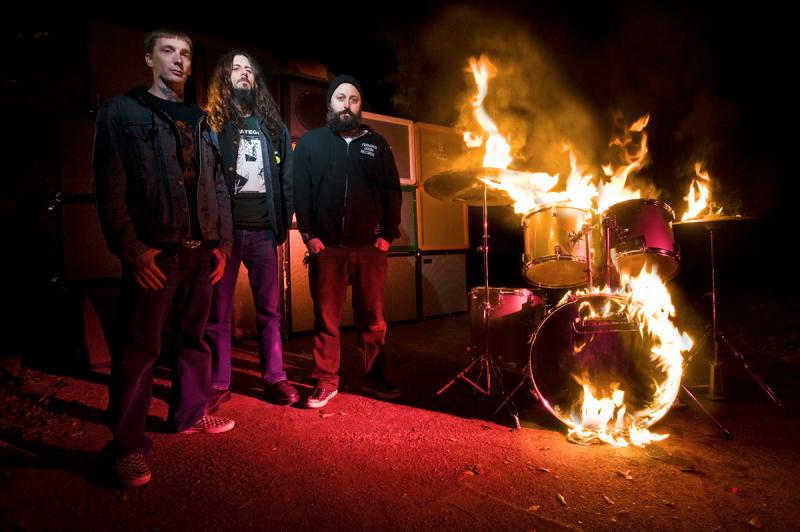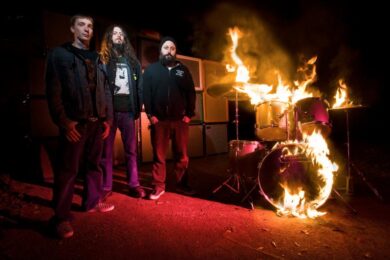If you only buy one doom-oriented album this year it’ll most likely be Sunn O)))’s Monoliths & Dimensions or Shrinebuilder’s self-titled debut. But shame on you, my friend, because you run the risk of missing out on the earthshaking likes of Sanford Parker’s Minsk, spelling bee losers The Deep Blue and my own personal favourite, Atlanta’s Zoroaster. The latter trio have generated a considerable buzz on the metal underground with their self-titled 2006 debut EP and 2007’s spine-melting Dog Magic, and their latest full-length, Voice Of Saturn, is a further refinement of the group’s spiral architecture; a spacious exercise in cosmic sludge which boasts hulking riffs aplenty but also benefits from a degree of textural adventurousness.
Far from being the kind of True Doom dullards who stubbornly limit their influences to the first couple of Candlemass and Trouble albums – you know, the ones who resemble Gimli the dwarf and despise Southern Lord with a pathetically ineffectual passion – Zoroaster are informed by a love of kosmische synth burble, shoegaze narcosis and the gut-churning experimentation of the almighty Godflesh.
The Quietus tracked down guitarist and vocalist Will Fiore to discuss studio geekery, the history of Moog-Metal, and the late Freddie Mercury.
Will, what kind of evolution does the new album represent for you and your splendid combo?
Will Fiore: With this one we had a little more time. With Dog Magic we came right off the road and we had about a week and a half to make the record. It was pretty rushed, and I think we were still getting used to Ed Rawls, who recorded us these past three times. This time around, originally, we were gonna just get fucked up, just make a bunch of noise and make it a sort of weird, improv-y record. But of course, after we recorded it, we took a two-week break and went back and listened to it, and we were like, ‘Man, nobody wants to hear this shit!’ So we went back in there, wrote another song and kinda tightened it up a little bit. Because once you’re not high, you’re like, ‘This really isn’t that interesting.’ Hahaha! But… yeah, we definitely took a little more time to let it sink in and think about where we wanted to take these songs. I took all the amp settings I’d normally use and screwed them up because live, everything sounds the same anyway – it’s just loud, and it’s heavy, and we wanted to get some different textures in on the record. Like, here’s the chance to make these songs sound a little different to how they’ll sound for the rest of my life, when I play ’em live.
It sounds like there’s a bit more space in there this time around. It’s decidedly less claustrophobic than Dog Magic.
WF: Oh definitely. It kind of gives you a little break for a minute.
The album has a highly evocative title, I must say, plus the the songs are bookended by an intro and an outro… is there some kind of theme or concept to this record? Pray do tell.
WF: Well actually, a buddy of ours, Travis Thatcher, he’s in a couple of bands in Atlanta, he built this oscillator kind of thing and called it The Voice Of Saturn. We had him on Dog Magic, he came in and did some noise at the end of ‘The Algebra Of Need’ and the idea was that he’d get in a room with us and we’d hook up all this stuff and make a bunch of noise. That was the original concept for the record. So that’s where that came from. So pretty much throughout the record, he comes in with these little bloops and bleeps with The Voice Of Saturn and all the Moogs and stuff.
The name conjures up mouthwatering images of vast, monolithic patchbays and infinite rows of dials, ripe for fiddling with – what does this thing actually look like?
WF: Well the one we got, it’s kinda just this boxy thing, with like, eight knobs on it… I think he’s got three different versions, with fancy pedals, y’know, stuff like that. They’re pretty basic, not pretty or anything, just there to make some noise. We’ve always been a fan of that sort of thing, especially in the beginning, me and Brent, between us we probably have about twelve Moogerfoogers [that’s ring modulation pedals, kids! – JS] and at the end of shows we’d sit there making noise for about twenty minutes to drive everybody out of the club, blow my speakers up and stuff.
I’m curious – where does the more cosmic/electronic side of Zoroaster come from? Are you fans of Tangerine Dream, Klaus Schulze, that sort of thing?
WF: Well, me and Brent, we’ve known each other since we were teenagers, and we got probably more influence from Godflesh and Swervedriver than anything else. We just kind of smashed them together and our music comes out that way a little bit.
Yes, I remember that when I first heard Dog Magic, I could most definitely hear a kind of organic, less industrial take on Godflesh in there.
WF: Yeah, definitely, and the horn solo on Swervedriver’s ‘Never Lose That Feeling’… that was an influence. Little bits from here and there, y’know?
Personally, I always think of the rather wonderful – and Ozzy-written – ‘Who Are You?’ off Black Sabbath’s Sabbath Bloody Sabbath as the grandfather of the Moog Metal microgenre…
WF: Oh, yeah! Also, our bass player, Brent [Anderson], he used to be part of a noise thing with another buddy of ours, and they used to just chill out with Theremins and Moogs and make crazy noise. That’s pretty much where that came from. When we played our first shows, we’d play a couple of things that we’d written and then just improvise noise and stuff – we didn’t have much material – then eventually we just incorporated all of that into the recordings. With the first EP, we didn’t have much time to put that element in. That’s why it’s pretty bare, y’know?
The new album has some lovely mellow sections, most obviously on ‘Spirit Molecule’ and the outro. They’re substantial and well-integrated, they don’t seem just tacked on as an afterthought. What inspired these interludes?
WF: Well, ‘Spirit Molecule’ was actually a song that I had written ten, twelve years ago in another band. I brought it back, gave it a rebirth, thinking it might make a cool Zoroaster song. We actually played it for like, two or three months, and it wasn’t until we were about to track it in the studio, that Dan [Scanlan], our drummer, was just like, ‘Hey, let’s extend it in the middle and put a piano in it!’ We tried it on the fly and it ended up sounding really cool.
That piano part reminds me of Allen Lanier’s sublime ivory-tinkling on one of my very favourite Blue Oyster Cult songs, namely ‘Flaming Telepaths’ from Secret Treaties.
WF: I know some Blue Oyster Cult but don’t think I’ve heard that song, I’ll have to check it out.
You really should, you know. Finally, I was wondering about your name, which has obvious religious significance. So are you Zoroastrians? Or are you named in honour of the late, great Farrokh Bulsara of Zanzibar, aka Freddie Mercury?
WF: Hahaha… we used to get that a lot, actually [I believe he’s referring to the religious connection, rather than the Freddie Mercury one, JS]. Everyone wondered what the deal was. One time early on, a friend of mine sent me a link to this genuine Zoroastrian website… and they’d posted up our tour dates!



